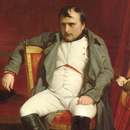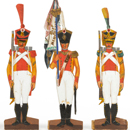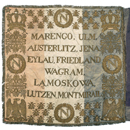The fall of the Empire
I defeated armies, but I could not conquer the flames, the frost, stupecfaction and death ! … I was forced to yield to fate. And, after all, how unfortunate for France! …. Indeed, for all Europe
Napoléon Bonaparte (1769-1821), Memoirs of the life, exile and conversations of Emperor Napoleon by the Count de Las Cases
In the wake of the peace of Tilsit (1807), the relationship between Napoleon and Alexander I, the emperor of Russia, had deteriorated for a variety of political, economic and ideological reasons.
In 1812, Russia had fully prepared for war, and Napoleon had assembled the greatest army of his time. Inferior in numbers, the Russians retreated, leading Napoleon ever further into the immensity of the steppes. The enormous distances, bad weather, illness, desertion, and the systematic destruction of the resources of the territory by the Russians weakened the Grande Armée of Napoleon, which was soon forced to retreat in full winter. Harassed by Cossacks and suffering from the cold, the army barely escaped complete annihilation.
The Russian campaign above all reinforced the determination of the enemies of France who, for the first time, united against her. The United Kingdom, the empires of Russia and Austria and the kingdoms of Prussia and Sweden formed the sixth anti-French coalition. They were soon joined by the German states of the Confederation of the Rhine. After the defeat at Leipzig (19 October 1913), the empire of Napoleon collapsed. Besieged and weakened, France had no more resources with which to oppose the invasion.

   
|

|
Listen to the souvenirs of the Napoleonic wars: Leipzig, by Lieutenant Chevalier (length : 2minutes 41seconds, french voiceover) |

The Russian campaign
With such a formidable army, Napoleon could have marched around the world ; fate ordered otherwise
Souvenir de l'expérience d'un soldat savoyard qui, des Pyramides à Moscou en passant par l'Espagne, la Vendée, l'Italie, la Syrie et l'Allemagne, revint indemne en Savoie (A personal narrative), Jean-Marie Merme

The collapse of the Empire
[…] the battle of Liepzig was the signal of the giant’s fall
Memoirs of the Countess Potocka













